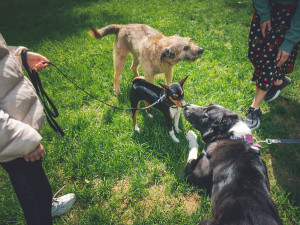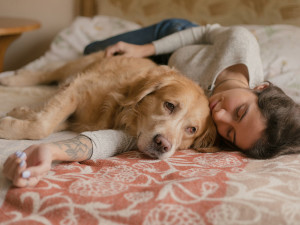Can Dogs Be Depressed? Signs and Treatment for Canine Depression
Blue is a good name for a dog—not a good mood.

Share Article
In This Article:
Is My Dog Depressed? What Can Trigger Depression in Dogs? Symptoms of Depression in Dogs Treatment Options for Canine Depression Is There a Cure for Canine Depression? Can Dogs Die from Depression?
Dogs can experience depression-like symptoms, due to factors, like major life changes or medical conditions, exhibiting signs, such as decreased appetite and lethargy. However, it’s essential for pet parents to consult with a veterinarian to rule out underlying health issues and determine the best course of action.
Depression affects many people and can be a major health issue for some. But can dogs experience depression too? Dr. Lore I. Haugopens in new tab, a board-certified veterinary behavior specialist who works at the VCA Lexington Boulevard Animal Hospital in Sugar Land, Texas, says, “Most likely, yes.”
Dr. Haug says that while there is no official depression diagnosis for dogs and cats, given the similarities to humans in their brain anatomy and neurochemistry, “it is reasonable to hypothesize that dogs do suffer depression in their own way.”
Is my dog depressed?
Because dogs can’t express what they’re feeling in terms that are clear to humans, diagnosing depression in dogs is challenging and uncommon. In people, clinical depression can include a variety of complex, persistent emotions and mental states, including:

Anhedonia (a reduction in the ability to feel pleasure)
Difficulty concentrating
Alterations in social behaviors
Trouble with making decisions
Learned helplessness
Pessimism about likely outcomes
Feelings of worthlessness
Excessive guilt
Thoughts of death
Identifying these feelings in dogs makes a definitive diagnosis of depression challengingopens in new tab, even for veterinary behaviorists. It’s possible your dog could be experiencing depression-like symptoms, especially if they begin after a major stressoropens in new tab or significant life change.
What can trigger depression in dogs?
Dr. Haug says that depression — in both humans and research animals — is in large part a response to feeling like one lacks control over their environment. As she puts it: “The feeling that nothing you do matters or can change your situation.”
In the case of dogs, this means that when they feel like they have no control over their lives — like when and what they eat, where to walk, and when and who they can play with — they may begin to experience feelings of helplessness that can lead to depression.
Hyper-controlling training styles can be similarly deleterious to the dog’s well-being, because, as Dr. Haug says, “the dogs do not have any choice or ability to express their own wants and needs.”
Other potential triggers, according to the American Kennel Club, include major changes to their environment and lifestyle, such as a big move, the loss of a human or animal companion, the introduction of a new baby or animal into the home, and social isolation.
Additionally, while experts don’t know whether depression is more common in certain breeds, dogs that experienced trauma or abuse may be more prone to it and require extra care and stimulation to help them manage feelings of fear and anxiety.
Symptoms of depression in dogs
Like humans, if your dog is withdrawn, or doesn’t seem interested in the activities they usually love (playing fetch, walking, or even eating) that could be a sign that they are experiencing depression. Dr. Haug is quick to underscore, however, that it’s important to rule out any potential physical ailments first.
“As there is overlap between behavior changes in dogs with medical issues and ‘depression,’ owners should always consult with a veterinarian before assuming their dog is depressed,” she says.
A sudden change in behavior, especially after a major life change, may lead some pet parents to wonder, “how do I know if my dog is depressed?” Some symptoms that could indicate a dog is depressed include:
Decreased appetite or weight loss
Lethargy or decreased activity levels
Withdrawal from or avoiding interaction with family members or other pets
Excessive sleeping
Loss of interest in activities they once enjoyed
Self-trauma or obsessive behavior
Should I take my dog to the vet for depression?
Again, it is important to note that all the above symptoms can also signal physical health issues as well. This is why it’s important to have your vet examine your dog to look for possible medical causes for altered behaviors. Even if you know that a significant life change occurred for your dog before the onset of their symptoms, it’s vital to rule out other health problems before assuming your dog is depressed.
Treatment options for canine depression
If you and your veterinarian are concerned that your dog is experiencing a depressive episode or has a depressive disorder, there are some treatment options available. For many dogs, simple, positive changes to their routine and environment may help to alleviate symptoms. Other dogs may need more intensive therapy or medicationsopens in new tab to begin feeling like themselves again. Your veterinarian may recommend treatment strategies for depressions such as:
Consulting with a veterinary behaviorist
Once physical health problems have been ruled out, your vet may recommend consultation with a veterinary behaviorist like Dr. Haug to better establish if depression could be the cause of your dog’s symptoms and set up a treatment and monitoring plan.
Reinforcing routines
Dogs seem to enjoy a predictable routine that helps to make them feel like their day is under control. As much as possible, try to establish a regular schedule of walks, feeding, playtime, and exercise that fits your dog’s lifestyle and activity level. If recent life events have disrupted your dog’s routine, try to return to a schedule that they were familiar with previously.
Environmental enrichment
Provide your dog with activities and distractions to help keep them active and mentally stimulated. Treat puzzles, play mats, and play dates can help to provide healthy diversions that your dog can enjoy.
Increased exercise
Incorporating exercise into your dog’s day can help to provide social interaction, quality time with you, and mental stimulation. If your dog has been a couch potato, always introduce and increase exercise gradually. Sudden overexertion and soreness won’t make this a pleasant addition to your dog’s routine.
Behavioral therapy
Working with a veterinary behaviorist can help to give you a variety of strategies to shape your dog’s behavior and perspective. The baseline concept of behavioral therapy is to reward desirable behaviors and avoid either purposefully or inadvertently rewarding unhealthy or undesirable responses. Punishing a dog for showing symptoms of depression is not productive and could worsen the condition.
Medication
Medication may be needed for some dogs with persistent depression-like symptoms. Some more natural solutions like pheromone collars, l-theanine, or alpha-casozepine may be recommended by your vet to see if they help. Starting on an SSRI medication is a bigger decision and may be one that is difficult to know the true effects of. SSRIs take about a month to reach full effectiveness, so separating the impact of the medication from other lifestyle modifications may be difficult if the medication is started early.
What can you do to help a dog who seems to be experiencing depression?
As with most maladies, human or canine, the best treatment for depression in dogs is prevention. Learn what type of environment, food, exercise, and mental stimulation is best for your dog, and provide it for them.
“Owners need to make appropriate breed choices for their living situation,” Dr. Haug says. A busy college student in a tiny apartment may love Labradors, she says, but that doesn’t mean they’re able to give them the attention, training, and exercise the breed needs to be happy and healthy.
If a dog is already showing symptoms of depression, and a veterinarian has ruled out any possible physical issues like pain or illness, Dr. Haug recommends finding a professional behaviorist who can evaluate the dog and their living situation, and provide recommendations appropriate for that animal, family, and home. For those interested in contacting a behaviorist, she recommends the following sites: American College of Veterinary Behaviorists, The American Veterinary Society of Animal Behavior, and the Pet Professional Guild.
Ultimately, whether your dog has seemed down in the dumps recently or not, Dr. Haug says it’s important to always make sure they receive adequate mental and physical stimulation, as well the necessary training and education to help both you and your pet better understand each other.
“Training classes are obligatory,” she says. “No dog should grow up ‘illiterate!’”
Is there a cure for canine depression?
How to cure dog depression is an open question because the diagnosis of depression in dogs is not well established. A combination of environmental enrichment, positive behavioral reinforcement, and medication may be needed to get depression-like symptoms under control.
Can dogs die from depression?
There have not been documented instances of dogs dying from depression. Some dogs showing depression-like symptoms may stop eating for a period, become lethargic, and show little interest in normal activities. These signs can be associated with other serious medical issues, so it’s important to have your dog examined if you’re worried that they’re depressed.
FAQs (People also ask):
Can dogs experience seasonal depression?
Although seasonal affective disorder (SAD) is not recognized in dogs like it is in people, dogs’ attitudes may change as the days get shorter and darker. It’s not clear if this is due to weather-related changes in routine or something bigger.
Should I contact a behaviorist if my dog seems depressed?
Once physical causes for your dog’s behavior changes have been ruled out, consulting with a veterinary behaviorist may be the best way to develop effective strategies to get your dog back to their routine.
Was Bunny the dog depressed?
It’s tough to know if dogs can have an existential crisis and learn to express their feelings about it. There’s still much to learn about how dogs interact with sound boardsopens in new tab, and this is a topic of ongoing research in the field.
References:

Madeleine Aggeler
Madeleine Aggeler is a freelance journalist and copywriter in Washington, D.C. Previously, she was a writer at New York magazine’s The Cut. She lives with her dog, Cleo, who works primarily as a foot warmer.

Dr. Bartley Harrison, DVM
Dr. Bartley Harrison is a veterinarian with more than 19 years of experience. He has treated a variety of species in emergency and speciality practices for both large and small animals. His primary interests as a vet are emergency medicine and critical care.
Related articles
![A dog resting its face on a wooden table.]()
Do Dogs Grieve When Other Dogs Die?
A study confirms our pets can have heartbreaking reactions to the loss of a canine companion.
![Person in a white dress with a calm tan dog leaning on their lap]()
How Dog-Appeasing Pheromones Can Help Dogs Relax
Hey, man. It’s all about those chemical messengers. See how Adaptil can help your pup.
Does Your Dog Need Anti-Anxiety Meds?
How to cope with dog anxiety—from training to medication.
![Shiba inu dog sleeping in bed]()
My Dog Sleeps All Day—Is That Normal?
Dogs need more sleep than humans. Here’s how much is healthy.
Can Dogs Feel Guilt?
They do look very sorry...
Do Anxious Dog Parents Raise More Anxious Dogs?
Which comes first: a nervous person or a nervous pup?











